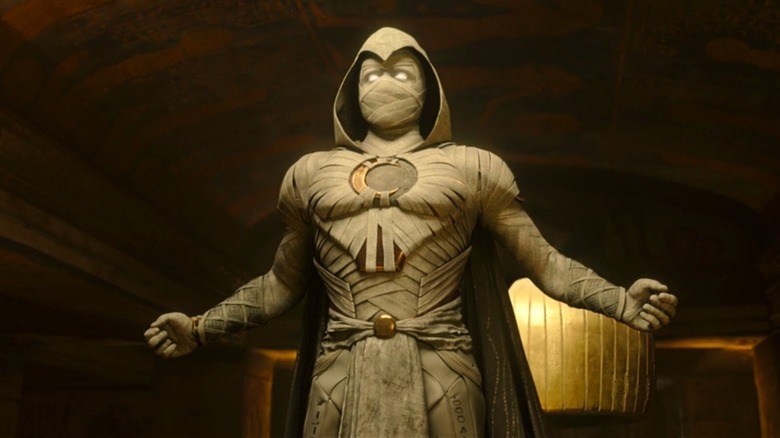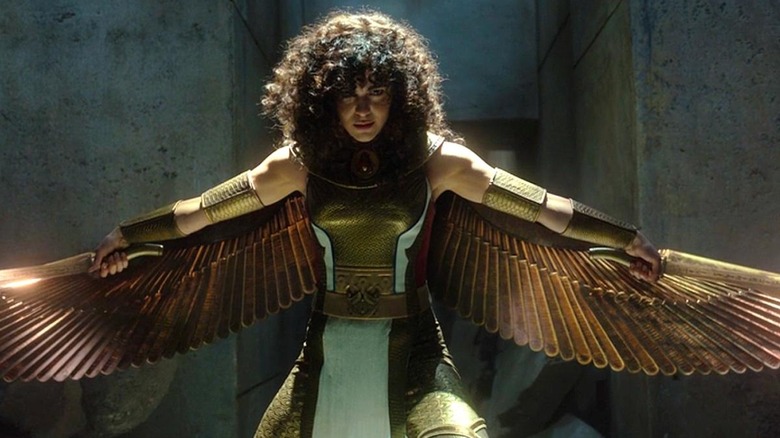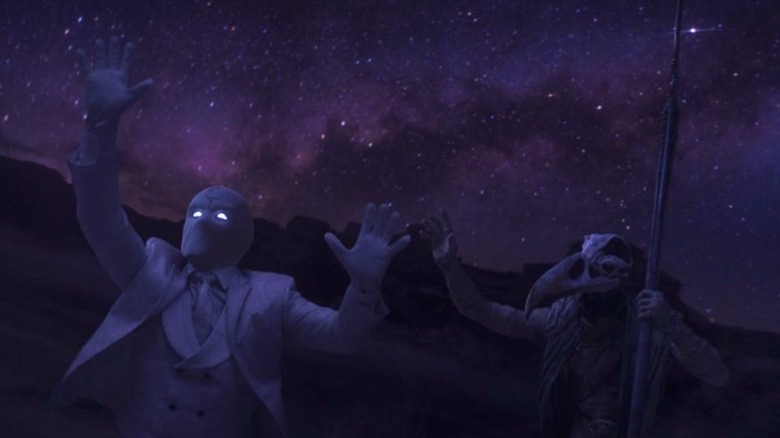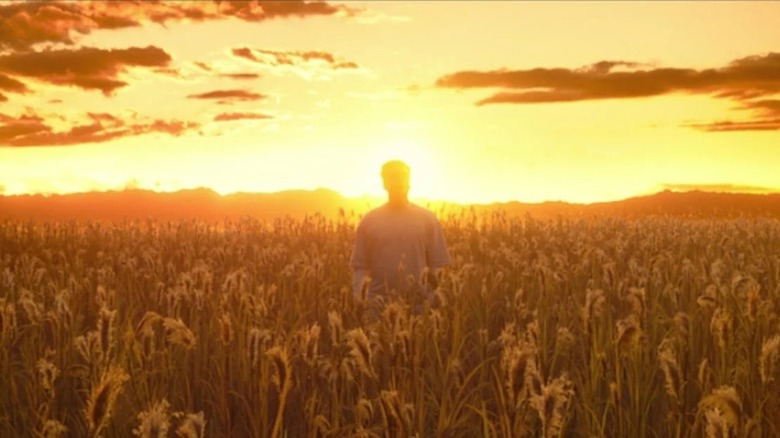Moon Knight Composer Hesham Nazih On Scoring The Show's Most Beautiful Moments [Interview]
Warning: spoilers ahead for "Moon Knight."
Adventure, fantasy, horror, and romance: Composer Hesham Nazih infuses the score for "Moon Knight" with a wide range of emotions. It all comes to an end in episode 6, "Gods and Monsters," in which Nazih unleashes his biggest track yet (the propulsive "New Skillsets") and introduces Scarlet Scarab with sounds of pure triumph.
Nazih, who previously scored "The Blue Elephant, "Sons of Rizk," and the moving "Pharaohs' Golden Parade," wanted to create a more modern score for "Moon Knight," rather than relying on old tropes previously used to depict Egypt. The composer had a great deal of freedom to accomplish that, too; he didn't even meet Marvel President Kevin Feige until the last day of work.
"It was amazing collaborating with him, and his notes were always spot on and always deserved the drama and propelled events and the scenes," Nazih said. "I must say, all the people I've met in Marvel are amazing people. If you're outside of the system, which I was outside of the system, they will guide you, they will help you out, they will show you the way, they will be accommodating and understanding."
Following the "Moon Knight" season finale, Nazih told us about composing some of the final episode's big moments, his use of choir and electronic music, and the one moment he was always building towards.
'I've been building up for this moment'
Is "New Skillsets" for the big finale the biggest track you created for the score?
Yeah, that must be. I had so many much longer tracks because this show had music wall-to-wall throughout the episodes. There were too few musical pauses and occasional little drops where I had to compose. But no, there were so many longer cues in the episodes, so this one was edited to be a little shorter than the way it was in the episodes ... It was really fun that I started the cue with a chase, or one of the action scenes, and where it goes down to a romance, and then it navigates to anticipation and a bit of spookiness, and then it drops again to action. It was a rollercoaster of musical cues.
You have the sound of triumph, too, when Layla becomes a superhero.
You know, I've been building up for this moment from the first episode. Whenever you saw Layla, I play bits of that music. Each and every time you see her, in any given moment, in any given situation, I played it. No matter what, no matter what was going to happen, I was playing for this [end moment].
There is something I need to say about this. The female figure in the deity, in the ancient Egyptian beliefs, is so important. You might be familiar with Isis, which is a great goddess. Yes, you may call her a goddess. She's a great, great female figure. I was waiting for the moment when Layla was revealed as a new Egyptian superhero. So yeah, I've gone with the theme in full.
How did you want to end your theme for "Moon Knight?"
Well, in the final episode, there was the "Moon Knight" theme in confrontation. Throughout the episodes, the "Moon Knight" theme was representing, of course, Moon Knight, Khonshu, and Marc because this theme, to me, encompasses and embodies these three things — this triangle, these three characters. The fact that the theme is not [typically] heroic, and it's not [typically] triumphant, [is] because of what Moon Knight is made of: his background, the background of Marc, and the nature of the relationship between Marc and Khonshu and all of that. It has a sense of darkness to it, anger, vengeance and all of that. It's a complex relationship. He's a complex character, Moon Knight.
There's a theme, all of that musical motif, for Arthur Harrow. So yeah, at the finale, there was Khonshu, Moon Knight in one theme, and Arthur Harrow coming in another musical theme, I may call it. So at the finale, everything was concluded. That's the theme for our superhero and that's the theme for the villains and this is the theme for the new hero, the Scarlet Scarab.
The "Moon Knight Theme" was complicated, right? It went through a few different iterations, correct?
This is the first idea I had. This is the first one I wrote. When I started writing, I wrote the one in the show. I strayed for three weeks maybe, four weeks, trying to make different ones — make it different, change it, alter it maybe. None of that worked. I always came back to it. My first one, she always won. It always won. It always prevailed.
After about a month working, trying to come up with different themes for Moon Knight, I got back to the first one I had in the first stage I played with my piano. This was the first idea I ever had for Moon Knight. I thought of playing it in so many different ways, but I've gone and I opted for the orchestral with the choral rendition of it because I thought that's the best way to present it. That's the best way to present Moon Knight and to present where he is coming from and what he is carrying upon his shoulder. So yeah, the first idea came to mind and that's the way I put it.
'I remember that night. I remember every night'
How'd you want to help express that sense of awe with "Constellation"?
This episode, the third episode, is quite an episode. It's very dynamic. It had dramatic tension, it had epicness, it had this moment and action scenes and everything. This is the moment when you begin to realize that Khonshu is not just evil. He's not just bad. This is where he sacrifices himself. This is a moment of heroism. This is where you emotionally relate to him.
It was quite an exceptional moment with a multitude of emotional directions towards the characters that have gone through for the three episodes so far. So I wanted the music to develop this relation between you as the audience and us as the audience in Khonshu and Steven, as well as Marc, throughout what was happening.
It all started with this beautiful line, beautiful delivery by F. Murray Abraham, "I remember that night. I remember every night." Wow. What a voice. What a delivery. You know, there was music before that and then I stopped when he said those two couple of lines, because he sounded way better than any instrument I could have ever thought of. The music took off again after he finished those lines.
When Marc and Steven are working as one and accepting each other, especially in that final episode, how'd you want the music to support their connection in the end?
That magnificent line of, "You're the only superpower I've ever had," and that's the one that Marc told Steven. He is not real. That's what happened with Steven in the fifth episode, but that line, it was a really touching moment that you really felt for Steven.
In the sixth episode, you kind of realize that this is not just a cure for Marc to get rid of Steven. The cure he wanted is to befriend Steven and to go save him from where he was and he wants him gone. And that powerful line that I just said was the trigger for the emotions that the music evolved around throughout this specific line between Marc and Steven, especially. "You're the only superpower I've ever had." It's amazing.
Did you ever score Marc and Steven's scenes differently? Did you ever approach them as two different characters before they came together in the end?
No, I did not change the music between Marc and Steven. I only pointed at this confrontation between Marc and Steven whenever it happened, whenever they see one another in the reflection on a mirror or maybe in a water surface, or wherever it was — in any reflection, Marc used to see Steven and Steven used to see Marc. I knew that these two are the two sides of the same coin.
And then at some point in time, there was Layla. When Layla appears, you begin to realize that Steven perhaps might be whatever she wanted Marc to have. A bit of romance, and chivalry, and this innocence, and this optimism and positiveness and light, perhaps that she wanted to find in Marc. Steven is just what Marc misses in the relationship. So yeah, they completed each other, to me, in the musical piece all pointed at they've confronted each other now.
Which instruments were you gravitating towards for the more romantic moments?
Well, back from the very beginning when Layla appeared and entered Marc/Steven's room and that was in the second episode, and then she looked at the fish tank and she kept tracking the room. When Steven started speaking in French saying those French few lines, I played their theme on piano, just piano. It was pure romance to me and it was a hit among all that was happening and all that was going to happen next. This bit was pure romance to me, so I've gone for string ensemble most of the time, woodwinds and the main theme would go sometimes in solo piano.
'Imagine the loss of the imagination'
There's a lot more choir in this score than we usually hear in Marvel's productions.
You know, I thought of voices and human voices only when I thought about the Egyptian aspects and Egyptian bits of the score. It's typical because Egyptian music is full of vocals and full of solo vocals. Of course, there are Egyptian instruments in the score, but the Egyptian vocalists get you there instantly. And then I started to add some classical choir onto it in conjunction with this.
It became an integral part of the score, it became the main focal point of the score, the human voices. In some situations, in some cues, the chorals and the human voices are the main component of the music and of the score. Sometimes they are singing on top of the orchestra, and other times, it's the other way around, the orchestra is backing them up. It was not intended from the very beginning in my head, but it became so while working, while developing the score.
What about electronic music? It mixes well with the orchestra.
Yeah, it's inevitable. Electronic music has become ... These instruments, it's like grabbing your guitar and playing music or playing the piano. When the scenes were taking place in the streets of Cairo, nowadays modern music in Egypt is full of electronic music and full of these sounds that are completely synthetic and completely electronic. So at some point, I wanted to use them to deliver the sense of the Egyptian modern music that's nowadays used.
Episode 5 is a standout in the series. There are themes of regret, loss, and a lot of pain going on in that episode. How did you want to help musically communicate those themes in that episode?
You're absolutely right about episode 5. It's full of everything in excess, in full. It was everything. There's the tragic upbringing of young Marc and his childhood trauma and what he'd gone through all the way up until he became a young man and what happened, and how Khonshu came across him, and how he became Moon Knight. There's the reason why Moon Knight is not just a merry superhero, it's not just about superhero and heroic action. There is a weight emotionally, a human weight [to] this suit that he summons, it's not another suit for another superhero.
Yeah, it's an amazing episode, really, with the ending, the loss of Steven. Imagine the loss of the imagination. Imagine the audience and me while watching. I cried because we lost Steven, knowing that Steven is just an imagination in Marc's head. Yet you want to keep it. It's a very emotional rollercoaster throughout those 50 minutes.
Did you want the score to play as an emotional rollercoaster in that episode?
The most challenging bit of this episode is getting the right character tone ... because it's full of turns and switches and flips. And getting it right was really challenging, in the best ways, really. It's full of comic relief, as well. There's so many comic reliefs there. Keeping the momentum running and developing and keeping it falling with all those turns was really challenging. I had to focus on the storyline and on the main lines and I had to keep all those lines and action lines musically propelled, and it was quite the ride, really.
"Moon Knight" season 1 is now available to stream on Disney+.



